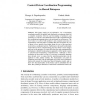Free Online Productivity Tools
i2Speak
i2Symbol
i2OCR
iTex2Img
iWeb2Print
iWeb2Shot
i2Type
iPdf2Split
iPdf2Merge
i2Bopomofo
i2Arabic
i2Style
i2Image
i2PDF
iLatex2Rtf
Sci2ools
109
click to vote
PACT
1997
Springer
1997
Springer
Control-Driven Coordination Programming in Shared Dataspace
This paper argues for an alternative way of designing coordination models for parallel and distributed environments based on a complete symmetry between and decoupling of producers and consumers, as well as a clear distinction between the computational and the coordination/communication work performed by each process. The novel idea is to allow both producer and consumer processes to communicate with each other in a fashion that does not dictate any one of them to have specific knowledge about the rest of the processes involved in a coordinated activity. Furthermore, the model is inherently control-driven where communicating processes observe state changes and react to the presence of events and where the main communication mechanism is limited broadcasting (as opposed to either point-to-point or unrestricted broadcasting communication). Although a direct realisation of this model in terms of a concrete coordination language does already exist, we argue that the underlying principles c...
Coordination Framework | Coordination Models | Distributed And Parallel Computing | PACT 1997 | Processes Observe State |
| Added | 08 Aug 2010 |
| Updated | 08 Aug 2010 |
| Type | Conference |
| Year | 1997 |
| Where | PACT |
| Authors | George A. Papadopoulos, Farhad Arbab |
Comments (0)

